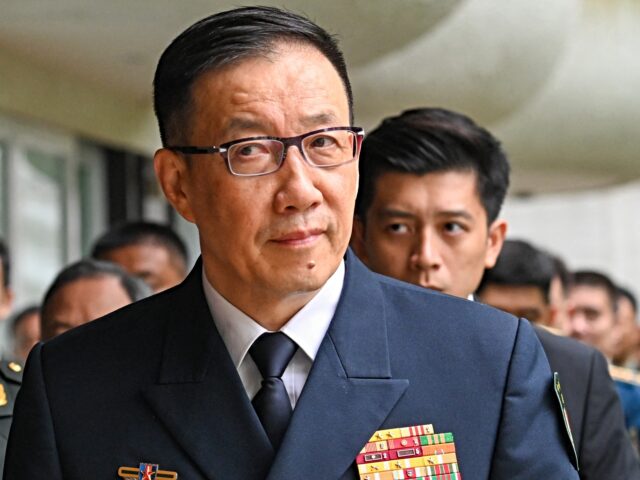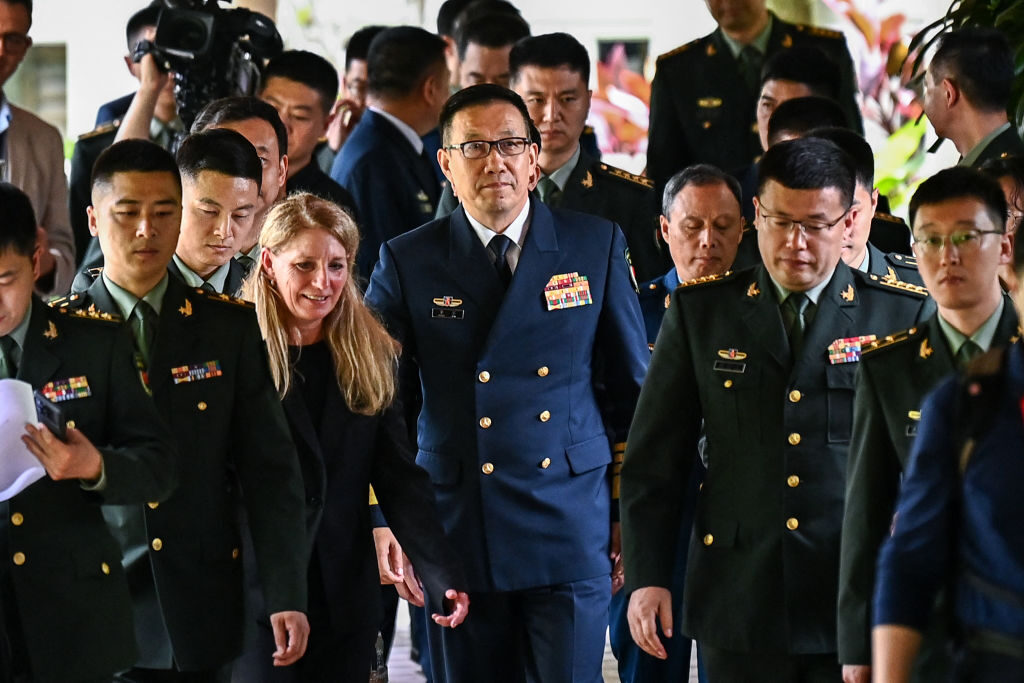Chinese Defense Minister Lectures Pentagon Chief Austin to Stay Out of Taiwan
 Roslan RAHMAN / AFP via Getty
Roslan RAHMAN / AFP via Getty
Chinese Defense Minister Dong Jun rebuffed U.S. concerns about China’s “provocative” behavior toward Taiwan, and told the U.S. to stop sending “wrong signals” to “separatist forces,” at a meeting with Secretary of Defense Lloyd Austin in Singapore on Friday.
The bilateral meeting, held on the sidelines of the Shangri-La Dialogue defense forum, was Austin’s first face-to-face meeting with a Chinese defense minister in two years. His previous meeting was with one of Dong’s predecessors. The Pentagon said Austin and Dong spoke for about 75 minutes on Friday.
As many observers expected, Dong took a hard line on Taiwan, where China recently conducted several days of intimidating military drills to express its outrage at the inauguration of President William Lai Ching-te.
Pentagon spokesman Maj. Gen. Patrick Ryder said Austin “expressed concern about recent provocative PLA activity around the Taiwan Strait, and he reiterated that the PRC should not use Taiwan's political transition – part of a normal, routine democratic process – as a pretext for coercive measures.”
Ryder said Austin “underscored” that the U.S. is still committed to the “One China” policy, in which America claims only one China exists in the world but refuses to state whether it recognizes the Republic of China or the “People's Republic of China,” and Washington desires “peace and stability across the Taiwan Strait.”
RELATED: NOT AGAIN… Chinese Navy Ship Harasses U.S. Destroyer During Taiwan Strait Maneuver
U.S. Navy / LOCAL NEWS X /TMXPLA is the People’s Liberation Army, while PRC stands for People’s Republic of China, the preferred name of the authoritarian government in Beijing.
Dong brushed Austin’s concerns aside, warning the U.S. not to interfere in China’s dealings with Taiwan or support “Taiwan independence.” He called on the U.S. to stop sending military aid to Taiwan, and accused the U.S. of sending “wrong signals” to “separatists.”
According to the Chinese Defense Ministry, Dong also told Austin it was improper for the United States to congratulate Lai on his election or send a congressional delegation to meet with him in Taiwan.
The Pentagon said Dong and Austin also discussed China’s territorial aggression in the South China Sea and the wars in Ukraine and Gaza, although fewer details were provided about those parts of the conversation.
“The Secretary made clear that the United States will continue to fly, sail, and operate – safely and responsibly – wherever international law allows. He underscored the importance of respect for high seas freedom of navigation guaranteed under international law, especially in the South China Sea,” Ryder said.
China frequently objects to the U.S. Navy’s Freedom of Navigation Operations (FONOP) in the South China Sea, which basically involve sailing through areas illegally claimed by Beijing while the Chinese Defense Ministry issues overwrought press releases about “closely monitoring” the Navy ships or “chasing them away” from certain islands.
Ryder said Austin chastised Dong for China’s refusal to condemn Russia’s “unprovoked war against Ukraine” and called on China to stop “supporting Russia’s defense industrial base.” Austin brought up recent U.S. intelligence reports that North Korean missiles have been used in Russia’s attacks on Ukrainian cities.
A senior U.S. official said Austin was “firm, but professional” in his encounter with Dong, who has only been defense minister for about six months, and does not have the official status of a decision-maker within the Chinese Communist Party, unlike most of his predecessors.

China's Defence Minister Dong Jun (C) walks out after a bilateral meeting with U.S. Secretary of Defence Lloyd Austin on the sidelines of the 21st Shangri-La Dialogue summit at the Shangri-La Hotel in Singapore on May 31, 2024. (NHAC NGUYEN/AFP via Getty Images)
Both Chinese and U.S. government sources said Austin and Dong made some progress on restoring high-level military communications between their respective armed forces. China terminated those contacts in 2022 after then-House Speaker Nancy Pelosi visited Taiwan.
Chinese Defense Ministry spokesman Wu Qian said the meeting in Singapore had a “positive effect” on “promoting understanding and avoiding miscalculation.” He said Austin and Dong agreed to establish a “crisis communications working group” as part of an effort to restore communications between the American and Chinese militaries.
According to Wu, Dong told Austin that “stabilization” of inter-military relations “does not come by easily, and shall be cherished dearly.”
Dong said stabilization would only be possible if both sides avoided trying to “contain or smear” the other. Containment and smearing are accusations China lobs at the U.S. on a regular basis, while Beijing would never admit it has tried to “contain or smear” the United States.
Wu said Dong expressed China’s commitment to allowing commercial vessels to “operate safely” in waters it claims, but insisted “there is a huge difference between freedom and willfulness, between navigation and trespassing.”
“It is important to respect others’ security concerns, and security should be mutually respected. No one can pursue one’s security at the expense of another country’s security,” Dong told Austin – another one-sided criticism, as China would never agree that any of its actions disrespect the security concerns of any other legitimate country.
Source link

